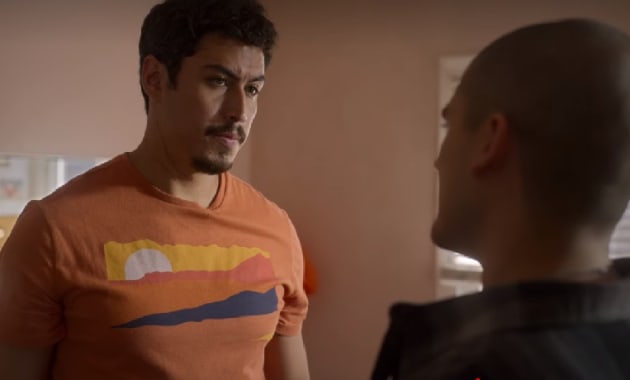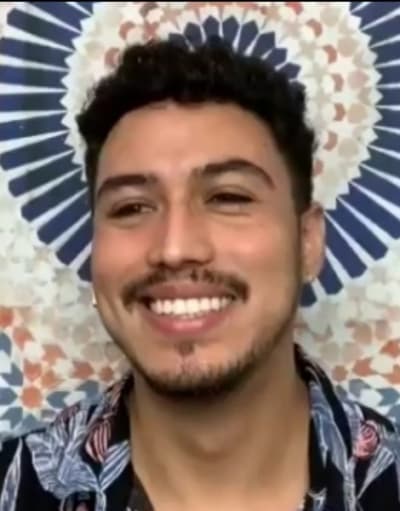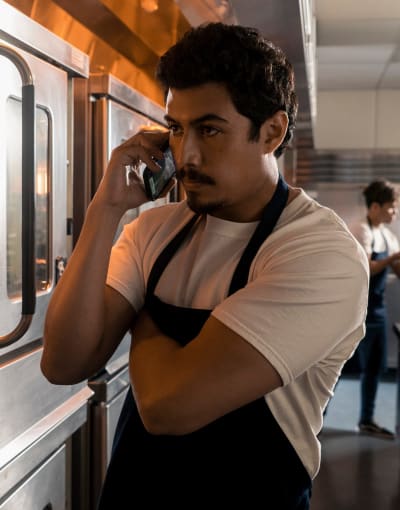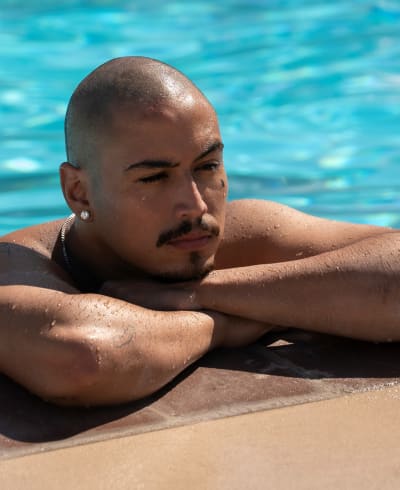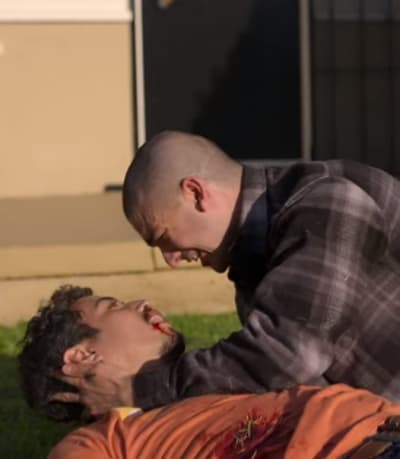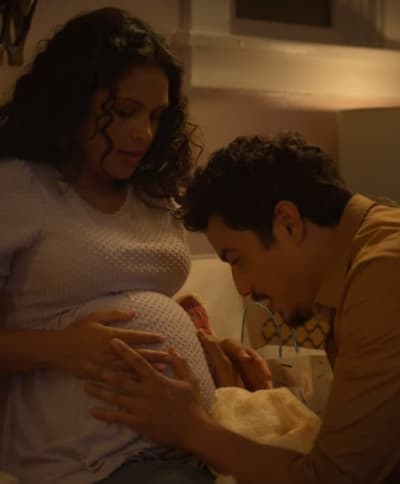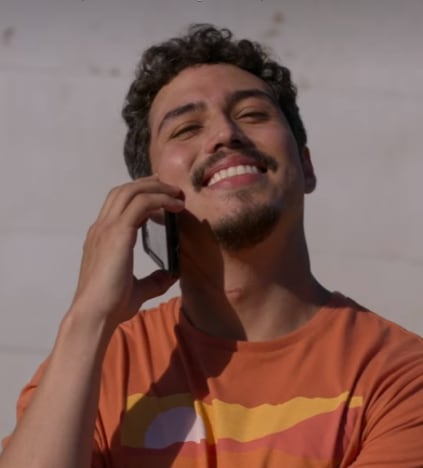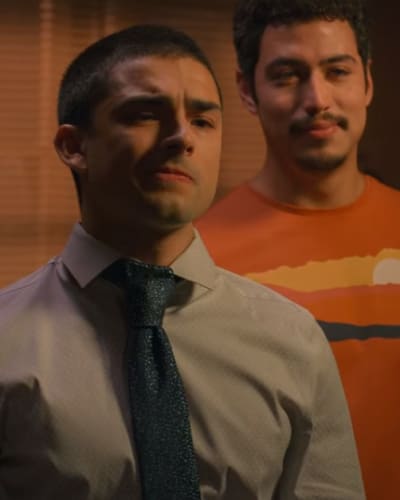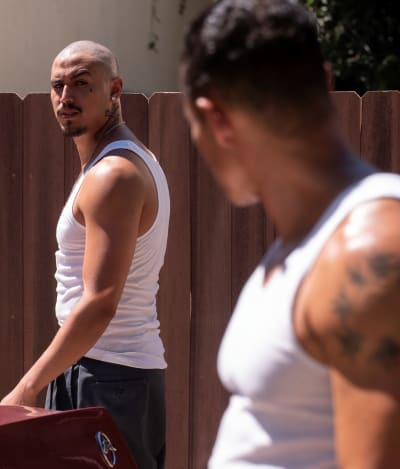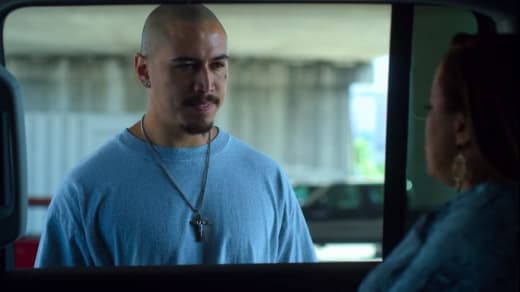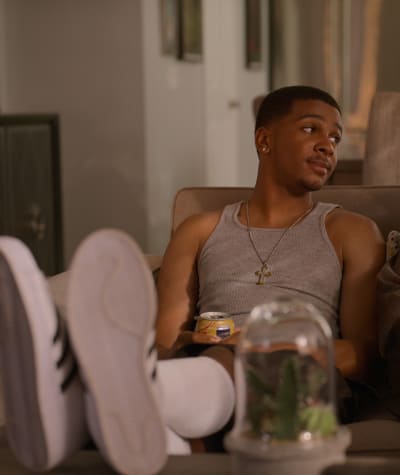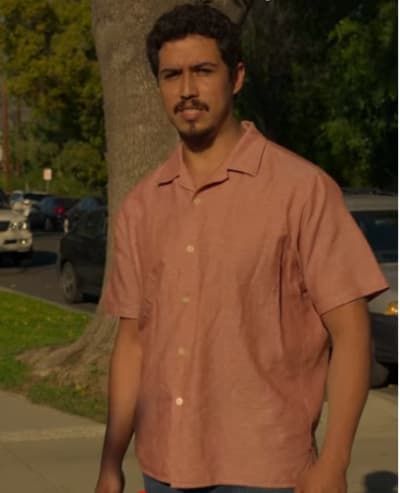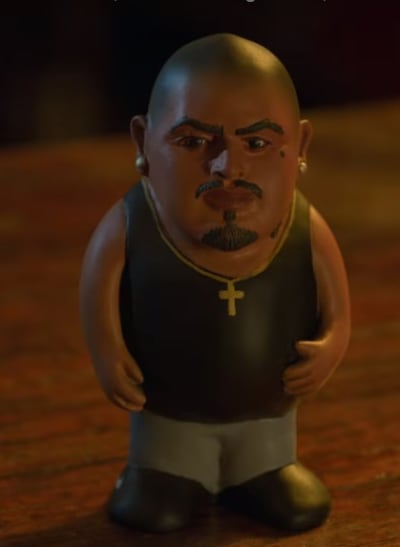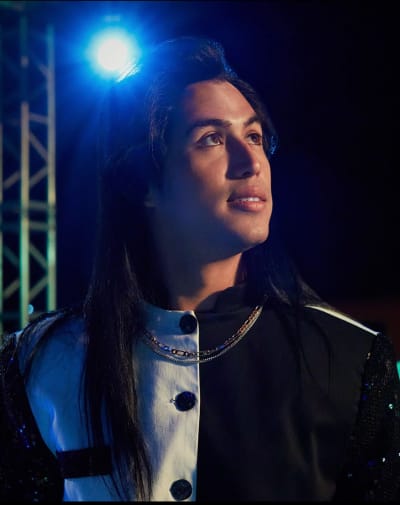If you watched On My Block Season 4, then you know Julio Macias hung up his Santos chain as Oscar “Spooky” Diaz, and you’re aware of his final chapter.
TV Fanatic had the distinct pleasure of hopping on Zoom to chat with the very gracious, thoughtful, and down-to-earth star about signing off as Spooky, saying goodbye to this landmark series, the importance of representation, his advice to the Freeridge cast, and so much more.
If you still haven’t caught up with the final season, spoilers lie ahead.
Check out excerpts here and the full interview below.
Did you ever imagine that this show would have the type of impact that it does? What do you think it is about this show that resonates so much with viewers?
Yeah, we definitely talk about representation and how close we hold it to the heart, but also, I think the comedy. It puts down people’s defenses, and it lets them put their guards down for a second, and then we hit them with the truth and with the educational pieces of the show.
Me, personally, I didn’t expect it to blow up the way that it did. Although, once it happened, I wasn’t particularly surprised. I knew the show was special, and when it resonated with the fans, I knew it made sense.
What I wasn’t expecting, which Brett has talked about in interviews, is how we feel the show has, in one way or another, impacted the landscape of television and streaming.
It shows that a show like this is profitable. It does work, and people do want to watch it, and you can have a show where there isn’t necessarily a white lead that we need to follow along. We don’t exclude anybody in the series, but it definitely shows that a Brown and Black-led show works.
What is about Oscar that resonates so much with fans? He became an instant fan favorite.
One of the things I hope people gravitate towards is what I gravitated towards when I read Cesar and Oscar going to the beach.
That beach scene, for me, was a game-changer for my character development. It showed everything that I needed to know about Oscar and why he’s doing it.
He’s not doing it for the money, but for the love of his brother, and he truly believes it’s the best way to protect him. Do I condone it? No. Can I empathically understand it? Absolutely. And, you know, people like a bad boy.
But I do hope that by the fourth season, the emotional response that we have from people towards Oscar shows that he’s grown past that bad boy immediate attraction into someone who we truly deeply care for.
Well, speaking of emotional… Walk me through your reaction to finding out that Oscar would get killed right after he had his perfect life in his sights.
There’s so many layers to this. I had the conversation with my fellow castmates, and I know that it’s on Twitter as well, which is ‘Why do we need to keep showing violence towards Brown and Black bodies? Why can’t this guy win? Why can’t he get out?’
And I totally agree with that. Does this man deserve better? Maybe. But this is the show that we’re presenting. This is the script that I was given, and I trusted the writers and directors of the show from day one, and I wasn’t going to start doubting them now.
I always believe that showing consequences for actions was something important, and I think that if we had seen Spooky die in a bank robbery, then it may not have been as impactful as this.
This opens conversations. This makes us think, “Who have I looked at in a certain light that might have been better or can be better, and can I look at them in a different light?”
Because it hurts so much — because it’s so painful, we care. We care what happens to this person. We care now, hopefully, what happens to the people that we reflect.
I wrote a little letter to Oscar, and I was like, “Yo, I’m sorry I couldn’t do more for you, man. I’m so happy that you gave me the strength to play you truthfully, tragedy and all.”
If you had to choose a different ending for Oscar, what would it be?
For the sake of his daughter, I would’ve liked to have seen him in Portland doing his restaurant thing. I do think that, at some point, some sort of consequence needed to catch up with him — whether it was jail time or a financial penalty.
Did he deserve a second, third, or fourth chance. I don’t know, but he definitely was trying.
Could he have been a counselor, could there have been another way of showing consequence? I think so, but I would’ve liked to have seen him play with his daughter.
Oscar refused to tell Cesar who did it. Was that his last attempt to ensure that Cesar didn’t go out for revenge?
Yeah, 100%. There were words written, and then when we were filming, they were trying to rework them, and then Lauren pitched the idea, “Why do you have to say anything? What is the most powerful thing you can do just to hold that attention, hold that moment with him?”
Even the choice to smile. Even in this traumatic moment, Oscar wanted the last thing Cesar saw to be his brother smiling. He’s saying, “Let this grudge die with me. Let this be done.”
It’s similar to when Ray hugs Spooky in Season 3. He never tells him that he’s sorry. He just says I’m going to show you. Oscar is going to show Cesar not to go after anybody because it doesn’t even matter. The bullet was aimed at me, but the anger was aimed at society as a whole, and you’re not going to be able to fix that by throwing down.
Oscar and Cesar’s relationship is almost as central to the series as the friends’. You guys are amazing. You and Diego have great chemistry. How do you cultivate that bond to capture that brotherhood so well?
The hardest scene to shoot was the tie scene — the very last tie scene. That was, by far, the most emotional moment in my acting career because the characters all lined up, me, Diego, Oscar, Cesar. It all culminated at this moment.
Oscar was saying goodbye to Cesar. But it was really me channeling, like, “Hey, Diego, you don’t need me anymore, man. You asked me so many questions in seasons one and two about ‘Am I doing this right? Do I need to stand here? Should my voice be deeper?’ All of these different questions, and at the end, there’s nothing left I have to teach you. You got this, bro. You can go on.”
It was taking the time to care about your castmates. When they say, “You play such a good bad guy. You’re so scary.” I’m only as scary as my castmates allow me to be. The fear that they play is what makes me intimidating more than me being intimidating.
And caring about Diego, his actual well-being, his actual aspirations — that love and that connection really comes through. I also saw it with Brett, who is one of my closest friends now.
I had such a blast playing the graveyard scene with him. But if I hadn’t cultivated that friendship outside of set, that would’ve been a very different scene.
You’ve played Spooky for so long that I can’t imagine it not being a part of you. What has playing that character taught you, and what have you learned from Spooky that you’ve incorporated into your own life?
That there is strength in presence, and do not shy away from that. You don’t have to use it negatively, but don’t let that power be taken away from you.
To be confident and self-conscious about your own strength and how you can use that to get what you want, but not in a violent way, just owning that space, that’s something he definitely taught me.
And also how to care deeply about your community to a fault. He followed the Santos code. Everyone else was like, “These are guidelines.” And he’s like, “No. This is a code, and there’s a reason that this code was written because before all the gang banging we were doing this to protect our community.”
How did the 25 years of Oscar’s life impact him? But also the generational trauma of Mexican American border crossing community and Zoot Suit Riots and how “The police aren’t going to protect us, so we have to protect us,” and how did that eventually twist and mode into the Santos?
The core value of that, unfortunately, is that society doesn’t care about us, so we need to care about us.
The way I look at it now, the talk of representation is so important, but it was a conversation that my friends and I weren’t having ten years ago. It was just that we needed to book the job. And now every single younger actor that I meet is so present about proper representation.
I have quite a bit of friends in the LGBTQ community. We talk about this almost double entendre: don’t shy away from playing gay characters because there’s nothing wrong with playing gay characters, but we also have a plethora of gay actors that can play this as well.
So that conversation of representation really matters, and thanks to Oscar, now I can move forward and take on more Chicano, and Latino, and Mexican-American roles and have conversations with directors like, “If this character is sitting in a room — I can understand why he doesn’t have any lines but is there a reason?
But if there is no reason other than having a Brown face in that scene, then write him out, and why am I even here? Pushing that conversation so that tokenism is more of a thing of the past than the future.
I won’t ask you who you loved working with the most because you’ll probably get in trouble with the group chat or something, but who do you wish you got the opportunity to work with more?
I wish I would’ve had more work with Brett. I think the dynamic between Jamal and Spooky was too damn funny, and I would’ve loved to have played that up more and had more scenes with him.
Outside of that Jessica, I think I had one scene with her, and she’s like one of my closest friends.
I consider her a comedic genius, so in the future, whatever endeavor she’s in, Jessica, cast me because I gotta work with you, girl! But in the context of these characters, I wish I would’ve worked more with Brett.
What was the final day of filming like for you? Now were you there for the last day of filming? Because I know they were done with you before.
No. I should’ve shown up, but I was mad tired, and they were like, “We’re wrapping at midnight, we’re wrapping at two, we’re wrapping at four!” I stayed up until two. I’m not going to make it, guys.
The final day of filming for me was the tie scene, and that was a culminating end of four years, of everything, that final goodbye to Cesar, the final goodbye to the show.
There was a moment afterward when Lauren stopped the set and clapped me out. There were people I didn’t even speak to who came up and said, “Working with you for four years was amazing.” I didn’t even know you were paying attention but thank you.
That was a huge rewarding thing. And people saying. “It was breezy working with you. It was fun, easy, and you made working with you enjoyable.” To have that be a repetitive thing from people helped me make a mental check of what I did on this set to make others feel comfortable.
That said, I was a wreck. It felt like I just finished climbing a mountain, fighting a bear. I told my wife, “It’s done. Oscar is done.” He is strong, he is toxic, he is powerful, he’s a lot, and now that weight is no longer on my shoulders. The work is there, and people can go back and watch it, but it’s not a “What’s he going to do next?
There was a couple of times where I felt like I was slipping, and I loved this character so much. There were times when there was a take I wanted to do one more time because this man deserves everything.
Did you take any mementos?
I did! I took the Santos cross. My Santos cross.
We had the hero cross and three extras, but we only ever used that one cross. I knew that because they put a gummy on the chain so that it didn’t mess with sound, and that little gummy was there the whole time we were filming.
So I said this is Oscar’s Santos chain. I took the earring studs, and a couple of the tattoos, the teardrop tattoo, and the neck tattoo. And they also gave me the Spooky Gnomie!
Where do you go from here?
Moving forward, the hustle never ends. Talking to writers more than anything, speaking to creators and creatives. You come out of this expecting — and the world has changed, representation has changed, but you get scripts, and you’re like, “We’re still here?”
So I think the best place to change that narrative is to be part of the creative process. I’ve been speaking to some phenomenal writers, and there are some interesting things down the pipeline.
I hope that my next thing is as much as an opposite as Pete was from Oscar. I want to be a chameleon. The biggest compliment that I can get is for people not to recognize me. That’s my goal.
Netflix broke the news that there’s a spinoff. What would your advice be for the next generation of the news Chapter of On My Block?
My advice to the Freeridge cast would be to trust your instincts. Make these characters your own. The words are there. Follow the words, follow the directors, and you showrunners because they’re fantastic, but trust your instincts.
If you think that you want to try something and they’re going against it, be like, “Hey, I’ll do it your way, but give me one where I can do this.”
Because you don’t know what they may find in that little spark. Don’t worry about living up to anything because we were at some point exactly where you were, so all you can do is be you, and people will love you.
The more genuine you are to yourself and to your community, the better it’s going to be for not only the show but yourselves.
You can stream the final season on Netflix, and we’ll keep you posted about the spinoff and Macias’ future projects as they come.
Jasmine Blu is a senior staff writer for TV Fanatic. Follow her on Twitter.
